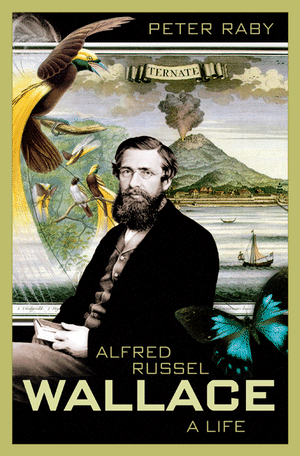Darwin's co-founder Wallace accepted intelligent design?
 Reader Malcolm Chisholm writes to point out that the systematically eclipsed Alfred Russel Wallace, cofounder of the theory of natural selection, accepted design in nature. Indeed, that was part of what led to his estrangement from Darwin and his circle.
Reader Malcolm Chisholm writes to point out that the systematically eclipsed Alfred Russel Wallace, cofounder of the theory of natural selection, accepted design in nature. Indeed, that was part of what led to his estrangement from Darwin and his circle.Chisholm notes,
Unlike Darwin, Wallace believed, and believed strongly, in intelligent design, right up to his death in 1913. He is buried about 5 miles from where I grew up in Dorset, England. There are no public memorials to him, although he has an impressive grave with a big fossil tree on top of it.
His final book, "The World of Life", written in 1910, was a response to the atheism of Ernst Haekel which directly criticized Wallace as a religious crank (Wallace was an ardent Spiritualist). Haekel wrote:
"In Germany, A. Zoellner and Fecher are quoted as instances; in England Wallace and Crookes. The regrettable circumstances that physicists and biologists of such distinction have been led astray by such spiritism is accounted for by their excess of imagination and defect of critical faculty, and partly by the powerful influence of dogmas which a religious education imprinted on the brain in early youth" [The Riddle of the Universe, 1899, trans. to English 1905].
A couple of quotes from "The World of Life":
"Darwin himself was quite distressed at my rejection of his own conclusion that even man's highest qualities and powers had been developed out of those of the lower animals by natural or sexual selection"
"This is that beyond all the phenomena of nature and their immediate causes and laws there is Mind and Purpose; and that the ultimate purpose is (so far as we can discern) the development of mankind for an enduring spiritual existence."
This from the co-founder (not co-discoverer) of the Theory of Evolution, the author of Wallace's Law, the discoverer of Wallace's Line, and the founder of the science of biogeography.
Wallace, like many scientists of his day, got caught up in Spiritualism - efforts to explore the immaterial world of the mind without any tools or parameters - efforts that exposed them to cranks and crackpots. This fact was often used to discredit Wallace later.
Indeed, one of the reasons I first became suspicious that Wallace was inappropriately discredited (just as Darwin was inappropriately exalted) was this: I observed that the same people who suppressed or air-brushed Darwin's racism were eager to exploit Wallace's spiritism - essentially to advance their materialist cult.
Darwin's materialist atheist supporters rejected Spiritualism, all right, but for precisely the wrong reasons - not because of fraudulent mediums but because they thought the human mind is an illusion. Fraudulent mediums were a gift to them. Genuine evidence of the reality of the mind was a problem to be suppressed.
Incidentally, the materialist lobby left its mark on twentieth century medicine. Materialism was so influential that, as Mario Beauregard and I note in The Spiritual Brain,
Early in the twentieth century, medicine came down firmly against the idea that the mind influenced the body and sought to trace illness to single, specific sources. Indeed, by the 1930s, the Index Medicus contained not a single reference to the effect of mental states on physiology. However, in the 1940s, “psychosomatic medicine” was introduced to foster better understanding and management of the relationship between mind and body in health. But the tendency to treat the body as a machine and the mind as an irrelevance prevented much advance in this area. In Timeless Medicine (1996), Benson illustrates how deeply this mechanistic approach affected medicine. A woman who suffered recurrent temporary bouts of numbness and weakness in several body parts was at first dismissed as merely imagining her symptoms. However, a new doctor conducted extensive tests and diagnosed multiple sclerosis, an incurable neurological disease that was disabling her and would eventually kill her. Her response? “Oh, I’m so relieved, I thought it was all in my head.” (P. 234)We go on to trace the slow but sure recovery of medicine from materialism. Not surprisingly, today's doctors are less likely than most people with science training to give much credit to Darwinism and its ideological allies. It's easy to explain why: Unlike paleontologists, they work with live subjects, not dead ones. They tried all that "you're just a pack of evolved neurons" stuff - and it didn't work. (My guess is it doesn't work in paleontology either, but how would we know?)
Note 1: Malcolm Chisholm, by the way, is the inventor of the excellent Mutation Works site. Best Richard Dawkins at his own game!
(Note 2: The image is the cover of Alfred Russel Wallace: A Life by Peter Raby.)
See also:
Sanity moment: Charles Darwin is not a saint
Aussie poli sci prof: Darwin's main claim to fame was his social status
Labels: Alfred Russel Wallace




<< Home